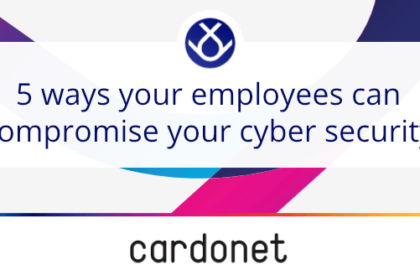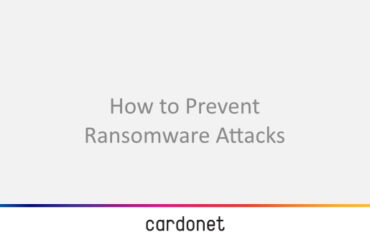
More than 80% of UK businesses faced a cyberattack over the last year. Many of these attacks were caused by employees.
It’s usually unintentional – the employees might not be well trained in cyber-security protocols, or worse yet, they may not be following that training.
Here are 5 ways your employees could be a risk to your business’s cybersecurity.
1. They have weak passwords
You have a physical, confidential file. If prying eyes were to find it, it’d spell disaster for your business. What do you do?
Well, the first step is securing it. For a file of this value, you’d spare no expense in getting a top of the range safe.
The thing is, if you make your birthday the code for the safe, it doesn’t matter how strong its walls are – anyone that is determined to get that file would be able to.
You, and your employees, need to think like this when choosing a password. An easy password, such as a birthday, a relative’s name, or a favourite sports team, is a huge risk to your cyber-security, no matter how sophisticated your software is.
Make sure that your passwords are not easy to guess. This means nothing that a potential hacker could find by peeking at your social media. It also means using long passwords, with a mix of numbers, letters, and symbols. If you want to be extra cautious, your employees should change them regularly.
2. They leave their devices lying around
Hybrid-working is great, but it does bring with it some risks. If your employee is working from a cafe, and they leave their laptop unattended, they’re handing your business’s sensitive data to hackers on a silver platter.
Now, hopefully, your employees use strong passwords, so they wouldn’t be able to access the data immediately. Unfortunately, if a hacker has the device in their possession, even the strongest password might not be good enough.
If they’re able to gain access to it, they could install malware that might infect your entire business’s server and hold your operations hostage. They could also use the employee’s access to poke around sensitive data, stealing and selling whatever they choose.
Your employees should treat their work device as if it’s a physical, confidential file, or the masterkey to all your premises. Leaving a device lying around is actually more dangerous than losing either of these, because a business device, in the wrong hands, could open your entire system.
3. They fall for a phishing attack
Phishing emails are one of the hacker’s most effective tools. The figures speak for themselves: almost half of UK cyberattacks use phishing in some way or another, and worldwide over 3.4 billion of these emails are sent a day.
These emails are so common that they’ve become a bit of a joke – everyone knows the stories about a distant member of royalty asking for a small sum so that they can unlock their fortune and make you rich.
These jokes, however, hide the seriousness of the situation. Phishing scams have become so sophisticated that anyone not practicing strict cyber safety protocols could become a victim.
If your employees aren’t trained to practice caution when opening emails and the links they contain, it could be disastrous for your business. Hackers can take full control of their devices, and if those devices are on your business’s server, it could become a massive security breach.
Ensure that your employees know what to look for in illegitimate emails and pay extra attention to any links they may click. If there’s anything that makes them doubt the email, they should report it to your IT team immediately.
4. They want to compromise your cybersecurity
The last three points tackled ways your employees could unintentionally put your business at risk. Unfortunately, it’s not always unintentional.
A decision may have made them disgruntled, and now they want to inflict harm onto the business. Or it may be greed – they could have been offered a large sum of money for customer data, proprietary information, or insight into your business’s cyber-security infrastructure.
Either way, it’s important to be aware that your employees may purposefully compromise your business’s data and systems.
You should have strict security policies and monitor employee behaviour if they begin to act suspiciously.
It’s important to remember that your employee is unlikely to make it obvious that they are stealing information – keep an eye out for employees who have just left the company, and ones who are going to be laid off in the coming months.
You should also be clear about what is and isn’t allowed – have strict guidelines that outline what they are and aren’t allowed to access, download, and share, and be sure to enforce these rules.
While you should be aware that this could happen, you shouldn’t treat your employees with constant suspicion. They need trust to do their jobs well – treating them like would-be criminals may only exacerbate the problem.
5. Your business does not have strict access policies
Even if all your employees are completely trustworthy, it makes sense to only give each member of staff access to the data that they need.
All the risks associated with the above-mentioned ways that your employees might compromise your cyber-security are compounded by weak access policies.
If a hacker managed to gain access to an employee’s business device, and that employee has access to all the customer data and confidential files on your company’s system, that hacker will have free reign.
Restricting access means that the damage they may cause by having a weak password or falling prey to a phishing scam can be limited. What could have been a catastrophic breach may only be a small one.
Employees should only be able to access sensitive information if they need it, and the employees that do need to access it must be trained in the correct cyber security protocols.
If you’re looking for a trusted IT partner to help you and your team build strong defences against cybercriminals, reach out to us today on +44 203 034 2244 or +1 323 984 8908. Alternatively, you can contact us online.
Our friendly team will ensure that you can rest easy knowing that your cyber-security is in safe hands. We have engineering bases in the United Kingdom, Europe and Southern California and our group of highly experienced engineers are available 24/7 to assist you in your move.



You must be logged in to post a comment.